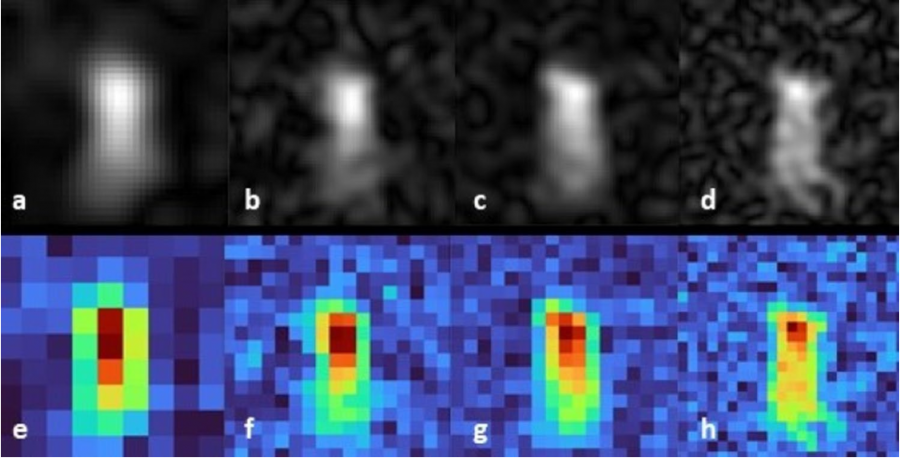News
Publikation: "Measurement and advanced data post-processing of proton resonance frequency shift in 7 T MRI to obtain local temperature in a tissue-mimicking phantom"
In der Zeitschrift tm - Technisches Messen wurde oben genannte Publikation am 09. August 2024 unter Mitwirkung der Co-Autoren Prof. Dr. Dr. Johannes Bernarding und Christian Bruns veröffentlicht. Für nähere Informationen siehe diesen Link.
Abstract
The radio-frequency (RF) transmit power deposition in tissue during magnetic resonance imaging (MRI) at ultra-high fields, i.e. B 0 ≥ 7 T, is a major challenge for pulse sequences requesting large flip angles. The absorbed RF energy can pose safety risk to patients as it is rising temperature in the tissue. The temperature can be accessed using MRI itself via the proton-resonance frequency (PRF) shift technique, which at low B 0 has been shown a valid MR thermometry method. In this paper, we explore the applicability of the PRF method to the assessment of local temperature in 7 T MRI procedures. To this end, we built a phantom filled with a material presenting electrical conductivity and permittivity close to muscle tissue. Tubes filled with oil were placed nearby the phantom to observe the time dependent B 0 drift. MRI phase images were acquired by gradient-echo (GRE) sequences at time points between spin-echo sequences with large flip angle allowing for a continuous assessment of the temperature during a 114 min RF-heating experiment. All acquired phase images were post-processed with attention to the time dependent instability of B 0, and, in addition, to potential spatial and temporal phase discontinuities, known as wraps. In this paper, we present a strategy to analyze and to unfold these phase wraps for large measurement fields and long acquisition times. It is shown that the PRF shift method is beneficial for the assessment of temperature at 7 T MRI. The temperature maps for axial and coronal planes display a temperature increase of approximately 3.5 °C during the time of the RF-heating experiment. Overall it is shown that B 0-drift correction and, importantly, the spatio-temporal unwrapping are an indispensable part of post-processing.
Publikation: "Detection of sub‐nmol amounts of the antiviral drug favipiravir in 19F MRI using photo‐chemically induced dynamic nuclear polarization"
Am 17. Januar wurde ein neuer Artikel in Scientific Reports veröffentlicht. Gratulation an die Autoren Johannes Bernarding, Christian Bruns, Isabell Prediger, Markus Mützel und Markus Plaumann.
Es ist gelungen kleinste Mengen Favipiravir mittels photo-CIDNP zu detektieren.
Hier geht es zu der Veröffentlichung: LINK
Detection of sub‐nmol amounts of the antiviral drug favipiravir in 19F MRI using photo‐chemically induced dynamic nuclear polarization

AMG-Kurse im September 2023
Am 11. und 12. September 2023 fanden die AMG-Kurstage (Grundlagen- und Aufbaukurs), die vom IBMI zweimal jährlich durchgeführt werden, statt. Nach drei Durchgängen als Online-Veranstaltung, fanden die Kurstage zum zweiten Mal in diesem Jahr wieder in Präsenz statt.
Bei den rund 15 Teilnehmern handelte es sich um Mitglieder in Studienteams wie Prüfer oder Study Nurses. Sowohl der AMG-Grundlagenkurs (11.9.23) als auch der AMG-Aufbaukurs (12.9.23) endete mit einem elektronischen Multiple-Choice-Test. Alle Absolventen erhalten ein Zertifikat, das zur Mitarbeit in Studienteams berechtigt und von den Ethikkommissionen und den Bundesoberbehörden anerkannt wird.
Weitere Informationen zu den Inhalten der beiden Kurstage finden Sie hier.
Wie auch in den zurückliegenden Jahren konnten wir uns auf die bewährte Kooperation mit der Firma pharmtrace klinische Entwicklung GmbH Berlin, dem Koordinierungszentrum für Klinische Studien Magdeburg (KKS MD), der Ethikkommission der OvGU und der Zentralapotheke der Universitätsmedizin verlassen. Stellvertretend für die genannten Einrichtungen danken wir auf diesem Wege ganz herzlich Herrn Dr. Richter (pharmtrace GmbH Berlin), Frau Dr. Wiede (KKS MD), Herrn Dr. Beck (Geschäftsführer Ethikkommission) sowie Frau Dr. Kramer (ZAP) für ihre Expertise.
Anträge auf statistische Beratungen
Im vergangenen Jahr sind am Institut für Biometrie und medizinische Informatik (IBMI) 54 Anträge auf biometrische/datentechnische Unterstützung bearbeitet worden. Die Anfragen betreffen hauptsächlich Beratungen im Rahmen wissenschaftlicher Arbeiten wie Promotionen, Habilitationen, Publikationen etc., aber auch die Betreuung klinischer Studien oder Drittmittelprojekte. Ihre Fragen zu statistischen Beratungen können Sie gern an schicken. Weitere Informationen und das Beratungsformular finden Sie hier.






